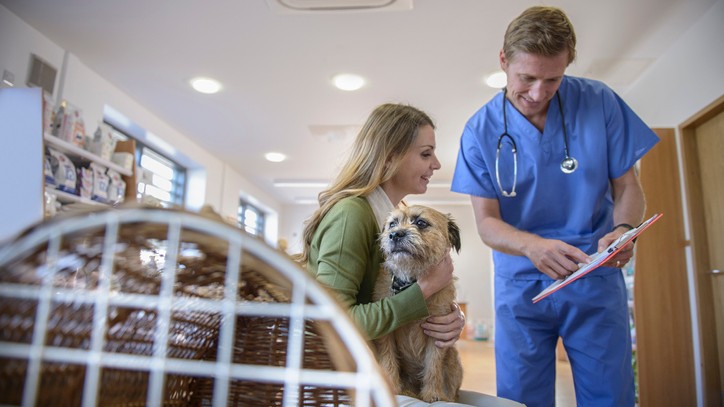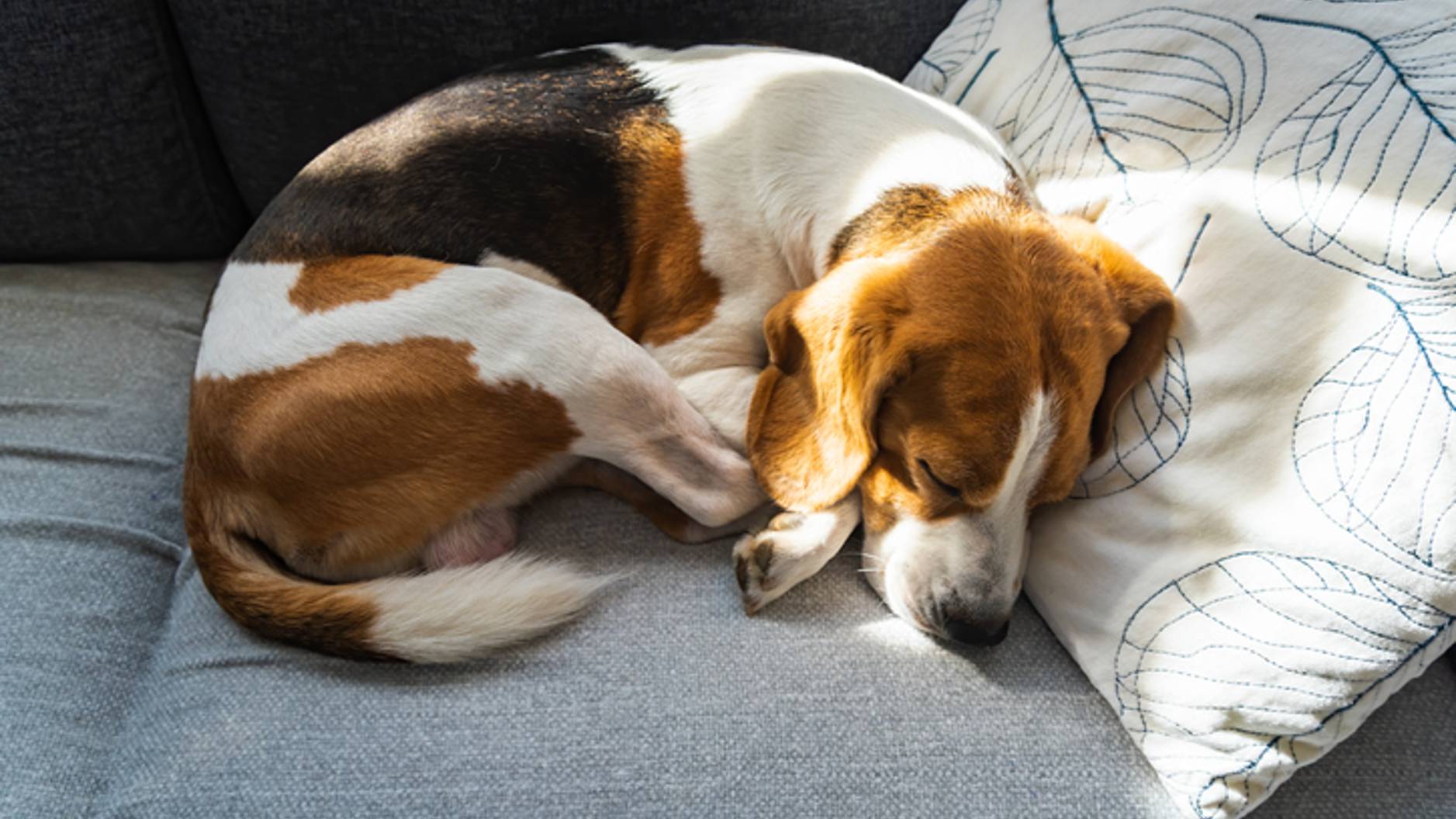Kennel cough in dogs: A vet's guide to symptoms, causes and treatment
From symptoms to treatment, find out how you can identify and help a dog with kennel cough

Does your dog love dog parks, the groomer, or even visiting pet stores? If so, he may be at risk of developing kennel cough. This highly contagious disease spreads quickly in areas where dogs congregate. If your dog experiences coughing, sneezing, or other respiratory signs after being around other dogs, it’s important to see a veterinarian to find out if kennel cough might be the culprit.
Fortunately, kennel cough is treatable and there are steps you can take to protect your dog and keep him healthy.
What is kennel cough?
You might be surprised to learn that “kennel cough” is actually not a specific disease. This term has been used to describe a wide variety of respiratory diseases in dogs, including Bordetella, canine distemper, canine influenza, and canine herpesvirus, among others.
Veterinarians often refer to this group of illnesses as Canine Infectious Respiratory Disease (CIRD). These diseases all cause similar symptoms. Testing to identify the exact disease that is causing your dog’s cough can be expensive and time-consuming, so most cases never receive a definitive diagnosis. Luckily, the treatment is generally the same regardless of the pathogen that caused your dog’s symptoms.
How do dogs get kennel cough?
Kennel cough is highly contagious and spreads quickly in environments where dogs are kept in close proximity, such as kennels, daycares, grooming salons, and shelters. Direct contact between dogs, droplets from an infected dog coughing or sneezing, and shared equipment such as water bowls can all contribute to the spread of kennel cough in these environments.
Dogs can even get kennel cough from visiting areas where a sick dog has recently been, such as a dog park. Even if your dog does not come into direct contact with an infected dog, the respiratory droplets left in the environment by a sick dog can put your dog at risk.
Causes of kennel cough
Some of the causes of kennel cough include:
Get the best advice, tips and top tech for your beloved Pets
- Bordatella bronchiseptica
- Canine adenovirus-2
- Canine herpesvirus
- Canine parainfluenza virus
- Canine influenza virus
- Canine distemper virus
- Pseudomonas
- E. coli
- Mycoplasma
Whilst some of these may cause a cough on their own, others weaken the immune system and allow other cough-causing illnesses to get a head start. The most common cause of kennel cough in the UK and US is Bordetella in combination with Parainfluenza virus.

Symptoms of kennel cough in dogs
Most dogs infected with kennel cough have mild symptoms, especially if they have been vaccinated for the disease. These dogs often recover on their own within a week or two.
However, some dogs can become very sick from kennel cough and may develop pneumonia. Severe symptoms occur more often in young puppies, unvaccinated dogs, and those that are stressed or immunocompromised.
Common signs of kennel cough include:
- Coughing
- Sneezing
- Discharge from the nose or eyes
- Gagging or retching after a cough
- Fever
- Lethargy
- Loss of appetite
- Difficulty breathing
It is important to remember that not every cough is caused by kennel cough. Other medical conditions, such as heart disease, collapsing trachea, or parasites can all cause coughing too. If your dog has recently developed any of the symptoms above, it is important to see your veterinarian for diagnosis and treatment.
How is kennel cough diagnosed?
If your dog is showing signs of kennel cough, it is important to see your veterinarian right away. When you make the appointment, be sure to let the veterinary staff know that your dog may be contagious. You may be asked to wait with your dog outside the building or to enter the clinic through a back door to reduce the risk of your dog infecting other dogs in the waiting room.
During the appointment, your veterinarian will perform a full physical examination on your dog, including listening to his lungs. In most cases, the diagnosis of kennel cough is made based on your dog’s history and physical exam findings. In severe cases, your veterinarian may recommend blood work, x-rays, or nasal swabs to help diagnose the problem and rule out other diseases that can cause similar symptoms.

How to treat kennel cough

There’s no NHS for pets. Veterinary care can be eye-wateringly expensive and most pets will need treatment for an illness or injury at some point in their life. It’s difficult to think about your animals being hurt or unwell, but you need to ask yourself: what would you do if you were faced with a vet bill for hundreds or thousands of pounds?
Most cases of kennel cough are mild and will resolve on their own without treatment. Most dogs will recover in about 10-14 days. During this time, your dog should have plenty of opportunities to rest and should be kept away from other dogs to reduce the spread of the disease. If the symptoms of kennel cough worsen or do not improve, then you should see your veterinarian for further treatment.
Some cases of kennel cough do require medication to help keep the dog comfortable and speed recovery time. Antibiotics are often prescribed to combat Bordetella, a common respiratory bacterium that can cause kennel cough. Severe cases may also be given fluids and appetite stimulants if needed.
If your dog’s coughing is harsh or severe, your veterinarian may also prescribe anti-inflammatory medications or cough suppressants. Although these medications do not treat the disease itself, they do help your dog feel better so he can rest more comfortably.
Treating kennel cough at home
There are a few other things you might want to try at home to help your dog. You can ‘steam’ him by shutting him in a steamy room after a bath or shower. This can help soothe the throat and move any mucus. Using a dog harness, rather than a collar, will help to prevent further trauma to their sore throat.
You should never give your dog any over-the-counter medications or home remedies without first consulting your veterinarian because many of these treatments can be toxic to dogs.

What should I do if one of my dogs has kennel cough?
In a multi-dog household, it’s best to separate the sick dog from the healthy ones if possible. This is especially important if any of the other dogs are very young, very old, or have other health concerns.
Try to limit traffic through the area where the sick dog is staying, and avoid sharing bowls, toys, or other supplies between dogs. After petting or playing with your sick dog, wash your hands thoroughly and consider changing your clothes before interacting with a high-risk pet.
Your veterinarian may also recommend vaccinating your healthy dogs to reduce the risk of spreading kennel cough.
Should you walk a dog with kennel cough?
You should also remember that your dog is extremely contagious to other dogs whilst he has kennel cough. He shouldn’t go to a dog walker, kennels, or doggy day care during his cough or for up to four weeks after his cough has passed, depending on your facility’s rules.
If you need to take your dog to the vet whilst he has kennel cough, please inform the reception team that you suspect your dog has kennel cough. They will likely ask you to wait with your dog in the car until the vet can see you to minimize the risk to other patients in the waiting area.

Preventing kennel cough
Kennel cough is a very common disease in dogs, but you can keep your dog healthy by knowing the signs and taking appropriate precautions. The good news is that many of the pathogens that cause kennel cough can be prevented through vaccination.
You may have heard your veterinarian recommend the “Kennel Cough” or “Bordetella” vaccine. This vaccine protects your dog against Bordetella bronchiseptica, a bacterium commonly implicated in cases of kennel cough. This vaccination is given every 6-12 months and is required by many boarding and grooming facilities. Although vaccination will not prevent all cases of kennel cough, it can decrease the severity of symptoms if your dog becomes infected.
Vaccines are also available for several respiratory viruses, such as canine distemper and canine influenza. Your veterinarian can help you determine which vaccinations your dog needs based on his age, health, lifestyle, and the disease prevalence in your local area.
Conclusion
Kennel cough is a common condition in dogs, especially if they meet other dogs on a walk or at daycare. Like the human cold, it’s caused by any of several bacteria or viruses. Most dogs will recover with minimal treatment, but you will need to keep them home to slow the spread of the disease. Some dogs do deteriorate, so if your dog becomes lethargic or isn’t recovering as expected, it’s time to call the vet.
Dr. Elizabeth Racine is a small animal general practice vet covering all things pet health and wellness. Her special interests include veterinary behavior, nutrition, and internal medicine.
As a freelance writer, Dr. Racine has written content for major companies in the industry such as the American Kennel Club, Merck Animal Health, Bayer PetBasics, Elanco, and CareCredit. In her free time, Dr. Racine enjoys playing trampoline dodgeball, hiking with her beagle Dasher, and spending time with her three mischievous cats.

